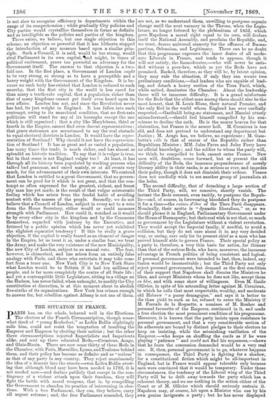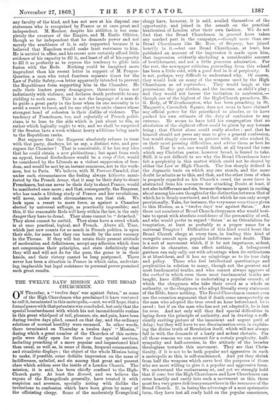THE SITUATION IN FRANCE.
PMUS has, on the whole, behaved well in the Elections. The electors of the Fourth Circumscription, though some- what tired of "young Rochefort," as Ledru Rollin slightingly calls him, could not resist the temptation of insulting the Emperor and Empress by electing their satirist ; but the other three circumscriptions rejected Imperialists and Impatients alike, and sent up three educated Reds,—Cremieux, Arago, and Glais-Bizoin. There are now some thirty of these Reds in the Chamber, with Paris, Marseilles, Lyons, and Toulouse behind them, and their policy has become as definite and as "serious" as that of any party in any country. They reject unanimously the idea of a descent into the streets—even Ledru Rollin avow- ing that although blood may have been needed in 1793, it is not needed now—and declare publicly that except in the con- tingency of a violent attack upon their freedom, they will fight the battle with moral weapons, that is, by compelling the Government to abandon its practice of intervening in elec- tions. With a free Parliament, they can, they believe, carry all urgent reforms ; and, the free Parliament conceded, they are not, as we understand them, unwilling to postpene organic change until the next vacancy in the Throne, when the Legis- lature, no longer fettered by the plebiscitum of 1852, which gave Napoleon a moral right equal to its own, will declare itself the National Assembly, and proclaim the Republic, and, we trust, decree universal amnesty for the offences of Buona- partism, Orleanism, and Legitimacy. There can be no doubt. that this programme expresses the inner desire of all mode- rate Liberals in France, and tends to appease, though it will not satisfy, the Immoderates,—who will never be satis- fied without a poor-law, which as yet the Reds have not promised. Backed, therefore, as they will be, by latent opinion, they may rule the situation, if only they can secure two preliminary conditions,—find leaders who are capable of lead- ing, and detach a heavy section of the Tiers Parti, which, while united, dominates the Chamber. About the leadership there will be immense difficulty. It is a grand misfortune for the Reds that the ablest man among them should also be the honest, that M. Louis Blanc, their natural Premier, and the only Red in the world whom England has ever cordially respected,—Garibaldi being.no statesman, and Mazzini utterly misunderstood,—should feel himself compelled by his con- science to decline the oath. He is the nearer heaven for that abstention, but France is the nearer hell. M. Cremieux is too. old, and does not pretend to understand any department but Justice ; M. .Arago has, we believe, no experience ; M. Gam- betta's role is that of orator of the Republic rather than Republican Minister ; MM. Jules Favre and Jules Ferry have no official knowledge ; and the soldier to whom the party will, we think, be compelled to look, cannot enter France. New- men will, doubtless, come forward, but at present the old difficulty of the Reds, the immense preponderance of merely literary ability in their ranks, is as serious as ever, and impedes. theirpolicy, though it does not diminish their ardour. France does not cordially wish to see another group of journalists at the helm.
The second difficulty, that of detaching a large section of the Third Party, will, we conceive, shortly vanish. The instant the Reds consent, even tacitly, to postpone the Repub7 lic—and, of course, in forswearing bloodshed they do postpone it for a time—the raison d'Are of the Tiers Parti disappears.. Nominally, their motto is "dynastic liberalism," or, as we should phrase it in England, Parliamentary Government under the House of Buonaparte ; but their real wish is not that, so much. as government by the Legislature without a violent revolution.. They would accept the Imperial family, if needful, to avoid a. collision, but they do not care about it in any very decided way, or caring, care only for its present chief as a man who has, proved himself able to govern France. Their special policy as a party is, therefore, a very thin basis for action, far thinner than that of the serious Reds, who have, moreover, the immense advantage in French politics of being consistent and logical. If personal government were intended to last, then, indeed, any fusion would be inconceivable ; but the Third Party not only reject personal government, but demand as the first condition of their support that Napoleon shall dismiss the Ministers he likes, and accept Ministers whom he does not like, accept therm en bloc, and with some show of willingness. Even M. Emile- 011ivier, in spite of his astounding letter against M. Cremieux, in which he calls that most respectable, wealthy, and moderate- old Hebrew "a pursy demagogue," and says it is better to die than yield to such as he, refused to enter the Ministry if M. Forcade de la Roquette, a nominee of M. Rouher and personal favourite of the Emperor, continued in it, and made a free election the most prominent condition of his programme. Moreover, it is known that the party insists upon resistance to personal government, and that a very considerable section of its adherents are bound by distinct pledges to their electors to keep on insisting, while the astonishing vacillation of the Emperor,—who keeps on shuffling the cards as if he were playing " patience " and could not find his sequences,—shows. that he fears the concession demanded would be a very real one. If, then, personal government is to go, whatever happens in consequence, the Third Party is fighting for a shadow, for a constitutional fiction which might be all-important in England, but in France would appear tolerable only because men were convinced that it would be temporary. Under those circumstances, the tendency of the Liberal wing of the Third Party will be to drift away towards the party which has a. coherent theory, and we see nothing in the action either of the Court or of M. 011ivier which should seriously restrain it. Napoleon may, of course, hit upon a Minister who can by his own genius invigorate a party ; but he has never displayed any faculty of the kind, and has not now at his disposal one statesman who is recognized by France as at once great and independent. M. Rotther, despite his abilities, is too com- pletely the creature of the Empire, and M. Emile 011ivier, though so far independent that he demands power and not merely the semblance of it, is only supported because it is believed that Napoleon would make least resistance to him. He is untried in office, and his recent acts certainly afford little evidence of his capacity to fill it, and least of all of his capacity to fill it so perfectly as to repress the tendency to glide into fusion with the Reds. Nothing could be imagined more imprudent than his recent letter in support of M. Ponyer- Quertier, a man who voted foarteen separate times for the Law of Public Safety,—a letter apparently intended to prevent the Republicans from supporting him in the Chamber. He calls their leaders pursy demagogues, threatens them not indistinctly with violence, and declares death preferable to any yielding to such men. This is not the language of a man fit to guide a great party in the hour when its one necessity is to avoid a resort to force, and its one object to unite classes whose strongest bond of cohesion is their dislike of violence. The tendency of Frenchmen, too, and esliecially of French politi- cians, is to lean to the side which is just about to v'in, or rather which logically ought to win, and we shall be surprised if the Session lasts a week without heavy additions being made to the Republican ranks. But suppose that the Emperor absolutely refuses to treat with that party, disobeys, let us say, a distinct vote, and pro- rogues the Chamber? That is conceivable, if he has any idea that he could obtain a new plebiscitum ; but apart from such an appeal, formal disobedience would be a coup d'etat, would be considered by the Liberals as a violent suppression of free- dom, and would be met by an instant summons, not to the work- men, but to Paris. We believe, with M. Prevost-Paradol, that under such circumstances the feeling always hitherto mani- fested by the French Army, that it may be their duty to shoot Frenchmen, but can never be their duty to shoot France, would be manifested once more ; and that, consequently, the Emperor, who has made a lifelong study of France and her revolutions, will never, under such circumstances, run that risk. We look upon a resort to mere force, as against a Chamber elected by universal suffrage, as practically impossible; and this, if the reasonable Reds will keep within the law, is the only danger they have to dread. They alone cannot be "detached." They alone cannot be outbid. They alone have a creed which is at once practical, logical, and French. Above all, Time, which just now counts for so much in French politics, is upon their side, for none but they can benefit by the next vacancy in the Throne. If they will but retain their present attitude of moderation and definiteness, accept any adhesion which does not compromise their principles, and state definitively what they will and will not do for the poor, the game is in their hands, and their victory cannot be long postponed. There never has been a situation in France in which calm, undeviat- ing, implacable but legal resistance to personal power promised such great results.



































 Previous page
Previous page